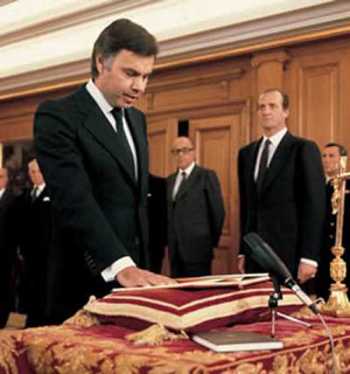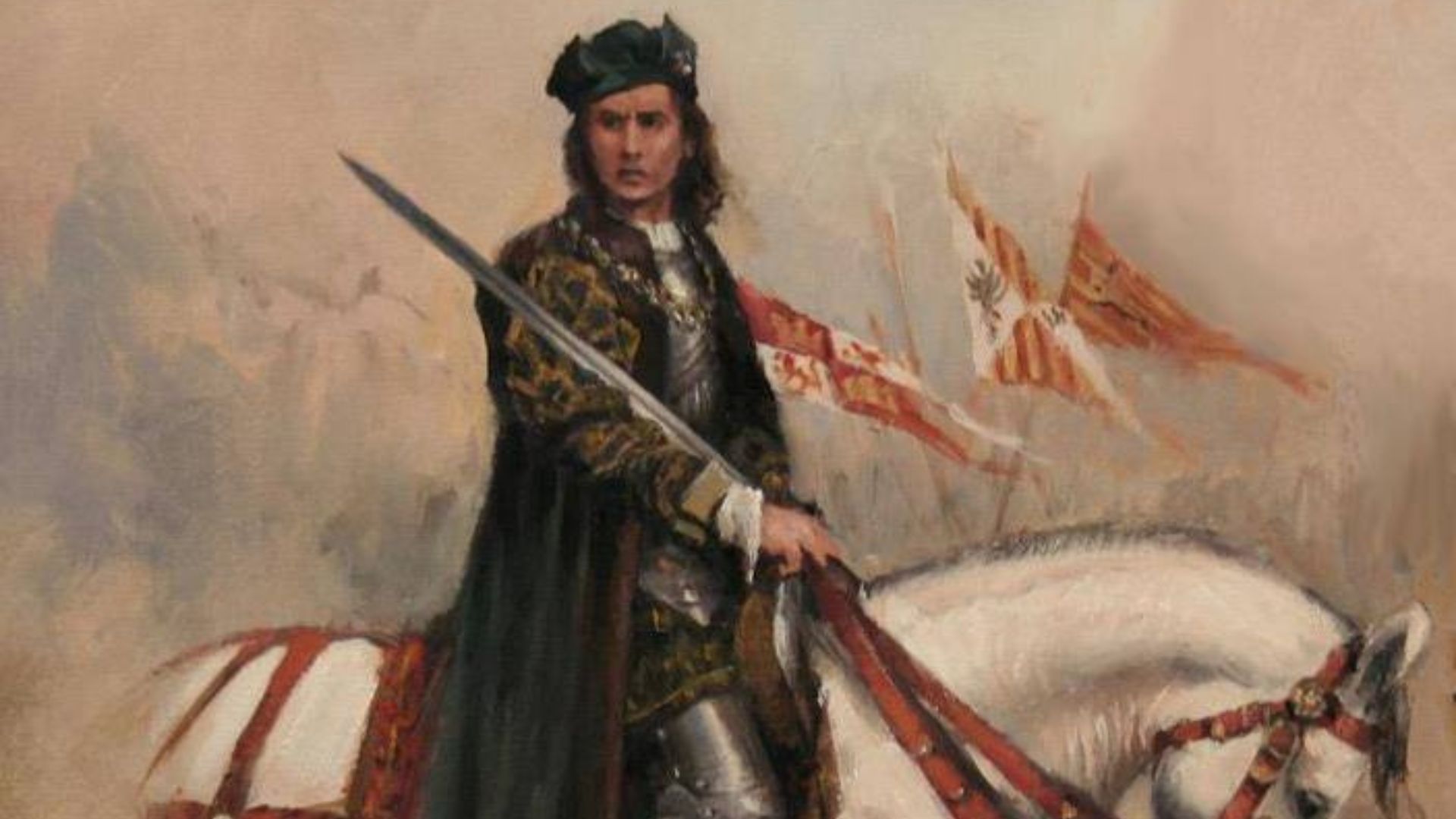December 2
Saint’s Day for Paulina, Aurelia and Lupo
1023 - In the mosque of Córdoba is elected as the new caliph Abd ar-Rahman V (brother of the late Muhammad II al-Mahdi), who takes the title of al-Mustazhir bi-llah (the imploring the aid of Allah).
1617 - Construction started of the Plaza Mayor in Madrid.
1873 - War of Cuba. The Spanish troops are defeated in Palo Seco by the natives, led by Maximo Gomez.
1875 - Antonio Cánovas del Castillo is named President of the Council of Ministers.
1897 - Spain concedes autonomy to Puerto Rico.
1906 - Signature Act bounding border between Spain and Portugal.
1925 - The dictator Miguel Primo de Rivera replaces the Military Directory.
1963 - The Government creates the Court of Public Order, special judicial instance for the repression of political crimes.

Felipe González - photo www.psoe.es
1987 - Spain and Britain reach agreement in London on joint use of Gibraltar Airport.
Births
1632 - Francisco de Tamariz, priest.
1753 - Francisco Javier de Balmis y Berenguer, military doctor and honorary surgeon of the court of King Charles IV.
1873 - Ramón I Orlandis i Despuig SJ, Spanish Jesuit priest and philosopher, founder of the magazine Christianity.
1902 - Milagros Leal, actress (d. 1975)
1940 - Raimon, singer and songwriter in the Valencian language.
1942 - Marisa Medina, actress (d. 2012)
1943 - Elisa Ramírez, actress.
1948 - Jorge Wagensberg, professor, researcher and writer.
1950 - Olvido García Valdés, poet.
1951 - Isabel Tenaille, television journalist.
1958 - Juan Ramón Lucas, journalist.
1966 - Joan Puigcercós, Catalan Politician.
1978 - David Rivas, footballer.
1978 - Fonsi Nieto, motorcycle rider.
1985 - Alberto de la Bella, footballer.
Deaths

1515 - Gonzalo Fernández de Córdoba, general and statesman who led successful military campaigns during the Conquest of Granada and the Italian Wars. His military victories and widespread popularity earned him the nickname "El Gran Capitán" ("The Great Captain"). He also negotiated the final surrender of Granada and later served as Viceroy of Naples. Fernández de Córdoba was a masterful military strategist and tactician. He was among the first Europeans to introduce the successful use of firearms on the battlefield and he reorganized his infantry to include pikes and firearms in effective defensive and offensive formations. The changes implemented by Fernández de Córdoba were instrumental in making the Spanish army a dominant force in Europe for more than a century and a half. For his extensive political and military success, he was made Duke of Santángelo (1497), Terranova (1502), Andría, Montalto and Sessa (1507).
Gonzalo Fernández de Córdoba was born on 1 September 1453 at Montilla in the province of Córdoba. He was the younger son of Pedro Fernández de Córdoba, Count of Aguilar (himself the son of Pedro Fernández de Córdoba, 1390–1424 and of Leonor de Arellano) and of Elvira de Herrera (daughter of Pedro Núñez de Herrera y Guzmán, d. 1430, and of Blanca Enriquez de Mendoza). In 1455 when Gonzalo was two years old, his father died. His older brother, Alonso, inherited all of their father's estates, leaving Gonzalo to seek his own fortune. In 1467 Gonzalo was first attached to the household of Alfonso, Prince of Asturias, the half-brother of King Henry IV of Castile. After Alfonso's death in 1468 Gonzalo devoted himself to Alfonso's sister, Isabella of Castile.
When King Henry IV died in 1474 Isabella proclaimed herself successor queen, disputing the right of Juana la Beltraneja (the king's 13-year-old daughter and her niece) to ascend the throne. During the ensuing civil war between the followers of Isabella and Juana, there was also conflict with Portugal since King Alfonso V of Portugal sided with his niece Juana. Gonzalo fought for Isabella under Alonso de Cárdenas, grand master of the Order of Santiago. In 1479 he fought in the final battle against the Portuguese leading 120 lancers. Cárdenas praised him for his service. When the war ended Isabella and her husband Ferdinand were the rulers of Castile and Aragon.[
Once the Catholic Monarchs had consolidated their rule, they embarked in 1481 on a ten-year campaign to conquer Granada, the last remaining Muslim stronghold on the Iberian peninsula. Fernández de Córdoba was an active participant in the fighting and distinguished himself as a brave and competent military leader. He gained renown for participation in the sieges of several walled towns including Loja, Tajara, Illora, and Montefrío. At Montefrío he was reported to be the first attacker over the walls. In 1492, Fernández de Córdoba captured the city of Granada, bringing an end to the war. The skills of a military engineer and a guerrilla fighter were equally useful. Because of his knowledge of Arabic and his familiarity with Boabdil, Gonzalo was chosen as one of the officers to arrange the surrender.
1547 - The Spanish conquistador, Hernán Cortés, the conqueror of Mexico, died on this day in Castilleja de la Cuesta, near Sevilla. (b. 1453)
1895 - Rafael Romero y Barros, painter (b. 1832)
1923 - Tomás Bretón Hernández, Composer (b. 1950)
1932 - Amadeo Vives i Roig was a musical composer, creator of over a hundred stage works. He is best known for Doña Francisquita, which Christopher Webber has praised for its 'easy lyricism and fluidity' (b. November 18, 1871 in Collbató)
1937 - José Comas y Solá, astronomer.
1982 - Antulio Sanjuan Ribes, theatre actor and poet.
1995 - Angel Crespo, poet, essayist, translator and critic of Spanish art.
